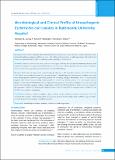Please use this identifier to cite or link to this item:
https://hdl.handle.net/20.500.14356/1732| Title: | Problems Faced by Antiretroviral (ARV) Drug Users in Kathmandu |
| Authors: | Karki, J Shakya, S |
| Citation: | KarkiJ., & ShakyaS. (2016). Problems Faced by Antiretroviral (ARV) Drug Users in Kathmandu. Journal of Nepal Health Research Council. https://doi.org/10.33314/jnhrc.v0i0.721 |
| Issue Date: | 2016 |
| Publisher: | Nepal Health Research Council |
| Article Type: | Original Article |
| Keywords: | ARV drug Kathmandu Problems |
| Series/Report no.: | Jan-April, 2016;721 |
| Abstract: | Abstract Background: Antiretroviral Therapy (ART) offers an opportunity to improve the prognosis and quality of life of People Living with HIV/AIDS (PLHIV). However, inability to achieve adherence even after drug introduction in Nepal is a matter of concern. Some efforts are to be applied in order to lend a hand to identify and minimize these problems. This study aims to assess the problems faced by antiretroviral drug users attending ART centers of Kathmandu. Methods: A descriptive study was carried out in Sukraraj Tropical and Infectious Disease Control Hospital, Teku and Bir Hospital in 2071. Non-probability convenience sampling technique was used to recruit 82 respondents. Semi-structured questionnaire was used for conducting the interview. Results: The overall problems faced by antiretroviral drug users include side-effects of drugs (65.9%), long waiting time (24.4%), unsatisfactory service (4.9%), geographical (68.3%) and financial barrier (25.6%), etc. Few were turned off from social/religious (70.7%) and recreational activities (51.2%). Absence of disclosure (14.6%), lack of spousal support (10.9%), humiliation (34.1%), etc. were also present. Stigmatization materializes as having to lose job (8.5%), feeling of ashamed (30.5%), feeling of isolation (34.1%), etc. Adherence towards medicine was found to be 86.5%. Conclusions: ART is a long term process and to achieve it rationally, a user has to cope with lots of problems, associated not only with physical health but also with outcomes of psychosocial issue. Further worsening of the situation is due to financial constraints. Policy making, planning and service delivery seek improvement in various steps. Awareness is another demand to end psychosocial discrimination. Keywords: ARV drug; kathmandu; problems. |
| Description: | Original Article |
| URI: | http://103.69.126.140:8080/handle/20.500.14356/1732 |
| ISSN: | Print ISSN: 1727-5482; Online ISSN: 1999-6217 |
| Appears in Collections: | Vol. 14 No. 1 Issue 32 Jan - Apr 2016 |
Files in This Item:
| File | Description | Size | Format | |
|---|---|---|---|---|
| 722-Article Text-1357-5-10-20160609.pdf | Fulltext Download | 211.96 kB | Adobe PDF |  View/Open |
Items in DSpace are protected by copyright, with all rights reserved, unless otherwise indicated.
